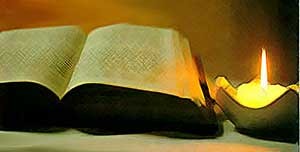There was a Pharisee named Nicodemus, a leader of the Jews. He came to Jesus by night and said to him, “Rabbi, we know that you are a teacher who has come from God; for no one can do these signs that you do apart from the presence of God.”
Jesus answered him, “Very truly, I tell you, no one can see the kingdom of God without being born from above.”
Nicodemus said to him, “How can anyone be born after having grown old? Can one enter a second time into the mother’s womb and be born?”
Jesus answered, “Very truly, I tell you, no one can enter the kingdom of God without being born of water and Spirit. What is born of the flesh is flesh, and what is born of the Spirit is spirit. Do not be astonished that I said to you, ‘You must be born from above.’ The wind blows where it chooses, and you hear the sound of it, but you do not know where it comes from or where it goes. So it is with everyone who is born of the Spirit.”
Nicodemus said to him, “How can these things be?”
Jesus answered him, “Are you a teacher of Israel, and yet you do not understand these things?”


The discussion following this time of contemplation was great and has lingered with me. I have one strong reaction that I would like to make. I disagree with the assertion that “Matter is born of matter and spirit is born of spirit” is a dualistic statement. It is simply an observation. We get no additional “program notes” saying “as Jesus said with finality.” Nor does Jesus condemn one or say the other is superior. He also does not say they are not intertwined with one another. As Rohr says (and I don’t have the book in front of me so I’m paraphrasing), we find in the Bible what we will bring to it. Making a discrimination between matter and spirit is not dualism. Jesus is responding to Nicodemus by saying he does not have to go back to his mother’s womb. “Don’t enter your mother, enter the Reign of God!” His “matter” is not what needs transforming, it is the spirit.